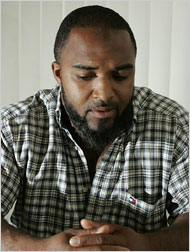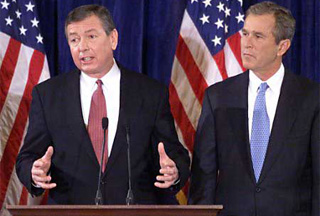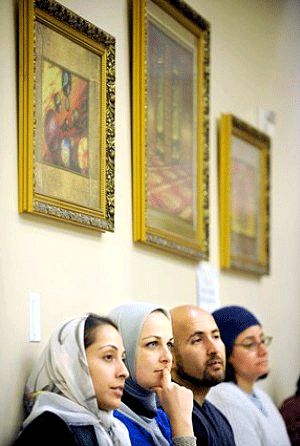Podcast: Play in new window | Download
Lawsuit Brought Against Former US Attorney General John Ashcroft
Last month, a major decision written by a federal judge gives a lawsuit standing that was brought against former US Attorney General John Ashcroft for the illegal and unconstitutional detention of American Muslims. The lawsuit was brought by Abdullah al-Kidd, an American citizen and African American who had coverted to Islam. In 2003 Al-Kidd was arrested, and detained under abusive conditions without evidence that he did anything wrong. The lawsuit points at the way John Ashcroft abused the material witness statute to “preventively detain” American Muslims. Ashcroft uses the statute as a pretext to arrest American Muslims without sufficient evidence to establish probable cause. This suit will be a key lawsuit when President Obama presents a proposal for a “preventive detention system.”
Lee Gelernt:
- Federal Appeals court recognized the abuse of the material witness statute under Ashcroft.
- Material witness statute, rarely used, limited purpose before 9/11. If the witness would not testify and needed testimony, they would arrest witness get testimony then release person.
- If its taking too long, get the person’s deposition, because you simply cannot hold a witness for a long time, because they’re completely innocent.
- After 9/11 the government used the material witness statute on Muslim men who were suspicious and no probable cause. Probable cause is the bedrock of this country. Mere suspicion is not enough.
- It turned out that dozens and dozens of men were arrested as mere witnesses, held for months under the most harsh conditions. They have to be unwilling to be a witness, you don’t simply arrest a witness, obstensibly.
- Abdullah al-Kidd, born in Kansas, spent some time in Los Angeles, and mostly in Seattle. African American born in the United States. His father is a supervisor at the Chino Correctional Institute in California. His mother has done work for IBM for the last thirty years.
- He was a football player, went to University of Idaho on a football scholarship. Right before 9/11 he converted to Islam, and started working for charitable organizations. After 9/11 he was under surveillance, then arrested, held for 16 days under the very abusive conditions. Restricted for 14 months.
- FBI agents went to magistrate saying Al-Kidd had a one-way ticket to Saudi Arabia, it turns out after spending time in detention, that it was a round-trip coach ticket.
- The agents also did not tell the magistrate that he cooperated with the FBI and a native born citizen.
- Lawsuit is against Attorney General in a personal capacity and two FBI agents who submitted an affadavit, the United States and 3 Wardens. Settled lawsuit against the 3 wardens.
- FBI Director Mueller, went before Congress to report on the recent successes of the terrorism fight. The first person Mueller mentions is Kalik Sheikh Mohammed, the second person is Abdullah al-Kidd.
- Bedrock principle: You’re innocent unless the government has probable cause (objective reasonable belief) not law enforcement acting under suspicion. In other countries, people can be arrested on suspicion.
Guest – ACLU Attorney Lee Gelernt, the Deputy Director of the Immigrants’ Rights Project. He has litigated many cases including the Detroit Free Press v. Ashcroft and North Jersey Media Group v. Ashcroft, which involved challenges to the government’s post-September 11 policy of holding secret deportation hearings.
———
FOIA Lawsuit to Make Public the FBI’s Domestic Investigative Operational Guidelines
Last month, a Muslim civil rights group filed a lawsuit against the FBI’s refusal to make public its surveillance guidelines of civic and religious organizations in connection with criminal investigations. The group Muslim Advocates, a national legal and educational organization filed a Freedom of Information Act suit against the Department of Justice. The lawsuit is seeking the text of the Domestic Investigative Operational Guidelines. The quote DIOGs which went into effect last December are practical manual interpreting revised surveillance guidelines. The interesting part of this story is that civil rights groups including Muslim Advocates were shown drafts of the FBI surveillance guidelines but were not given a copy.
- Agent are provocateurs sent into mosques. Muslim Americans should not have to look over their shoulders while they’re praying.
- Suspicion based on not wrongdoing and criminality, but religion. What concerns us is the set of guidelines issued during the waning days of the Bush Administration, that further and potentially expand FBI powers.
- We were able to see those guidelines in a meeting with the FBI, but not keep a copy of the guidelines. Those guidelines went into effect 1-2 weeks after that meeting.
- We sought formal channels to get a copy of those guidelines then filed a FOIA request.
- It’s been almost a year later, and we still have not got a copy of the guidelines.
- We would hope that the FBI would be working in consistence with the President’s committment to greater transparency
- The FBI said our request is under review and may be redacting or blacking out sections of the guidelines.
- We think the public has a right to know how the powers of the FBI have been expanded and are wielded in our name. What we saw in the draft guidelines were “gathering data about racial and ethnic communities” Geo-mapping of communities.
- Changes made to FBI guidelines under former Attorney General Ashcroft allow line agent FBI to make decisions based on limited evidence of criminality. One example, a prominent Pakistani physician made pro-democracy comments for Pakistan in a US newspaper. Days later he was visited by the FBI who wanted to ask him general political questions about Pakistan and Pakistani leaders.
- Check out Muslim Advocates “Got Rights?” Video.
Guest – Farhana Khera, first Executive Director of Muslim Advocates and the National Association of Muslim Lawyers (NAML). Prior to joining Muslim Advocates and NAML in 2005, Ms. Khera was Counsel to the U.S. Senate Judiciary Committee, Subcommittee on the Constitution, Civil Rights, and Property Rights. In the Senate, she worked for six years directly for Senator Russell D. Feingold (D_WI), the Chairman of the Constitution Subcommittee. Ms. Khera focused substantially on the USA PATRIOT Act, racial and religious profiling, and other civil liberties issues raised by the government’s anti_terrorism policies since September 11, 2001. She was the Senator’s lead staff member in developing anti_racial profiling legislation and organizing subcommittee hearings on racial profiling.


